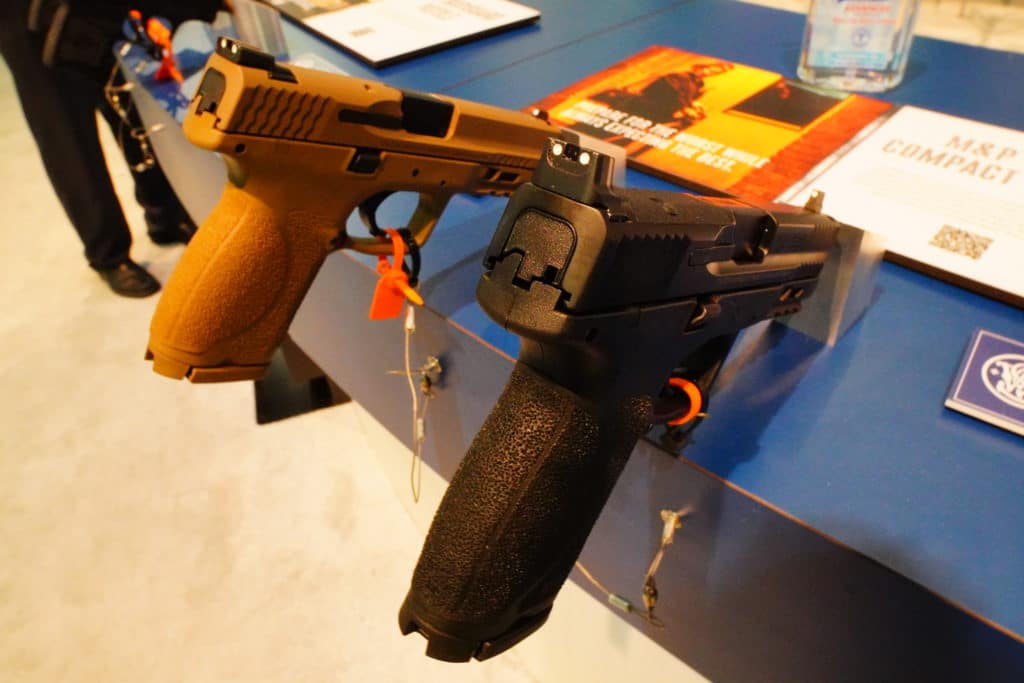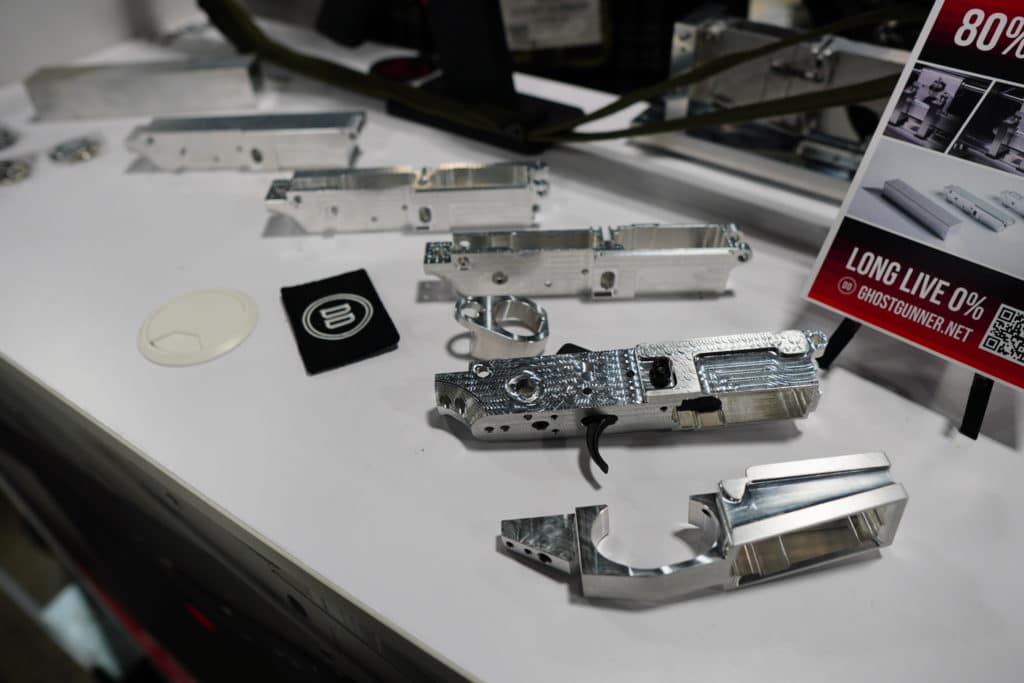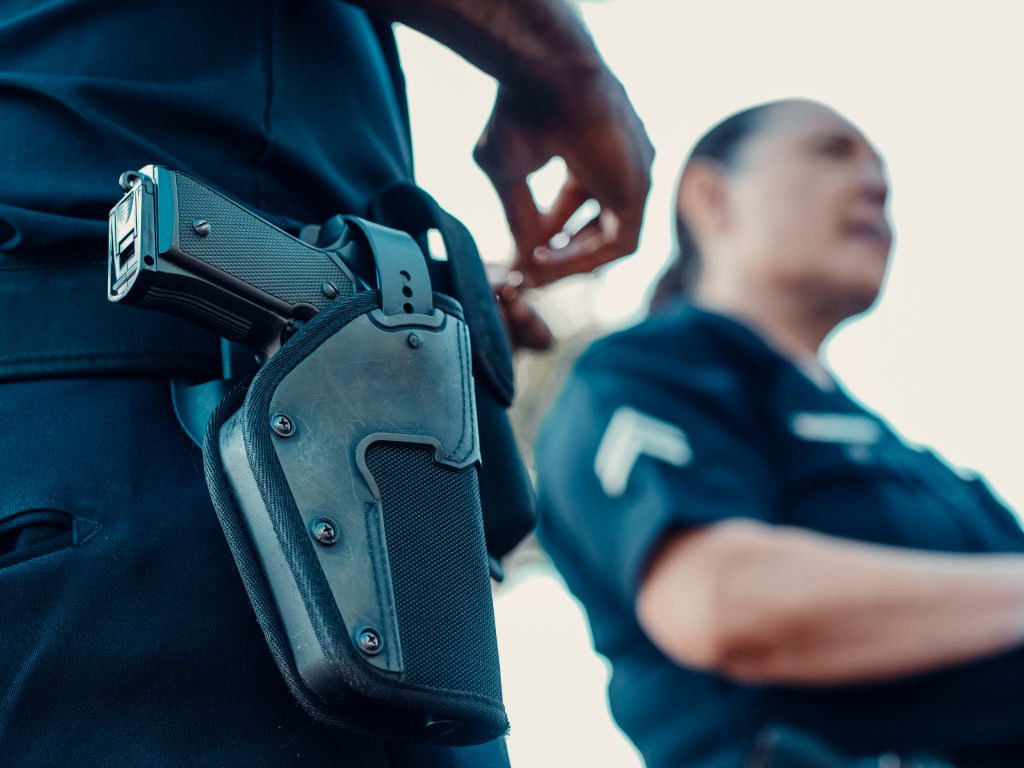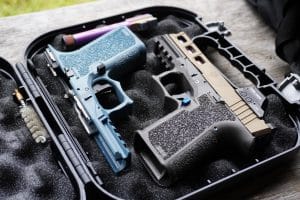We covered the first-of-its-kind San Jose gun ownership tax extensively this week. So, I wanted to explain where the ordinance is likely headed. That’s the first thing we dive into this week.
Then, on the podcast, I talk with Cody Wilson about his latest initiative to thwart the Biden Administration’s attempt to crack down on “ghost guns.” He and his company have created a process to go from a bare block of Aluminum to a finished frame with their custom CNC machine. The process further democratizes the manufacturing of firearms and further complicates the conversation around gun crime and gun control.
Plus, Contributing Writer Jake Fogleman examines how the Texas synagogue attacker obtained his gun and why gun laws didn’t stop.

Analysis: How Will San Jose’s Gun Ownership Tax, Insurance Requirement Play Out? [Member Exclusive]
By Stephen Gutowski
San Jose, California was the first city to ever mandate gun owners pay an annual tax and carry liability insurance. It’s already facing a legal challenge with more being primed. So, how will it all turn out?
There are a few scenarios. The ordinance could get shot down immediately in court and abandoned by the city. It could survive scrutiny and multiply across deep-blue jurisdictions. Or it could set off a fight that goes all the way up to the Supreme Court.
We’ve seen the first two outcomes a number of times in recent years.
Los Angeles tried to force out city contractors who were members of the NRA or did work for them back in 2019. San Francisco quickly followed suit. But, after a federal judge struck down the ordinance as unconstitutional, both cities gave up on the idea altogether.
This seems like the most likely outcome. This is a novel law that tries to levy a tax and insurance requirement directly on the exercise of a constitutional right. San Jose officials argue this is necessary to offset and prevent gun violence, but the same logic could be used to justify placing a tax and insurance requirement on publishing or protesting to offset and prevent misinformation or hate speech.
Then there are multiple California gun laws that have made it through the federal court system intact. The unique expansions on the state’s “assault weapons” ban to incorporate devices like bullet buttons and thumbhole stocks, the may-issue carry permit law, and the state’s magazine ban have all passed muster at the Ninth Circuit Court of Appeals without being taken up by the Supreme Court. Even if a lower court strikes down the tax and insurance mandate, as happened with those laws, the Ninth Circuit could very well uphold it on appeal and SCOTUS could ignore it.
That strikes me as unlikely, though.
The Supreme Court does have a long streak of denying appeals out of California. In fact, it’s never taken a gun case from there. But, that’s mostly because of the Court’s general lack of Second Amendment litigation overall. It’s taken six significant Second Amendment cases in its entire history.
However, the Court appears to be eager to expand the case law. It took a gun case in 2020 and, after declaring it moot, it took another one in 2021. It will need to take more if it’s interested in building a coherent approach to the amendment.
Perhaps the new majority of the Court will turn out to be as interested in doing that as Justice Clearance Thomas has been for years. He’s chastised the Court for not doing more to build on the landmark 2008 Heller case, which established the Constitution protects an individual right to keep and bear arms. In a 2020 dissent, joined by Justice Bret Kavanaugh, he decried the court’s “decade-long failure to protect the Second Amendment.”
The San Jose ordinance would be a fairly easy one for the Court to take up because it strikes directly at the heart of Heller. They wouldn’t have to explore a new area of law. Heller dealt with whether the government could restrict people from owning commonly-available guns inside their own home.
The only real difference here is between the burden imposed by a tax and insurance mandate versus an outright ban. One is obviously more burdensome than the other, but it’s likely the Court won’t be favorable to the former either.
So, the fight is set up and the only question is how long it lasts.
Podcast: ‘Ghost Gun’ Pioneer Cody Wilson on How He Makes AR-15s From Blocks of Raw Metal [Member Early Access]
By Stephen Gutowski
Cody Wilson joins the show this week. He is the founder of Defense Distributed and one of the main innovators in homemade guns. His Liberator 3D-printed gun brought him to prominence years ago and he’s continued to push the boundaries of what’s possible in simplified gun-making with increasingly-common technology.
In fact, he and his company have even focused on making some of that technology more common. Defense Distributed is now selling the third iteration of its “ghost gunner” mill. The miniaturized CNC machine can finish AR-15 receivers from blocks that are about 80 percent finished.
And, now, it can do even more. It can actually take a raw brick of metal and turn it into a part necessary to make a receiver. They call it a zero percent lower.

I saw the mill in action at SHOT Show 2022 and Cody describes the inspiration behind the latest project. The ATF has proposed a federal rule change that would expand its authority to determine what constitutes a firearm receiver and, therefore, who would have to obtain a license to make and sell them alongside serializing the guns and keeping records on who buys them. The new rule would allow the agency to determine a wide scoop of unfinished gun parts are “readily convertible” to finished receivers, but the agency said it does not plan to try and regulate raw metal blocks.
That’s the point where Wilson said he saw an opportunity to get ahead of the regulation even before it’s finalized. And the zero percent project was born from that idea. Now, the company has successfully created and rolled out a design to consumers.
Still, Wilson faces significant legal battles across the country over state and federal attempts to block either the manufacture of personal firearms or even block sharing plans for how to make them. He provides an update on the state of the multiple lawsuits Defense Distributed is still embroiled in.
He also addresses why he decided to retake such a public-facing role at the company after he pled guilty to a crime resulting from him paying for sex with a 17-year-old girl, especially given the concerns unserialized guns are often used by criminals. Wilson said being the public face of the company is dangerous and he wasn’t willing to have others take his place in that role.
Plus, Contributing Writer Jake Fogleman and I discuss San Jose’s first-of-its-kind attempt to force gun owners to pay an annual tax and acquire liability insurance.
You can listen to the show on your favorite podcasting app or by clicking here.
You can also watch the episode on our YouTube channel.

Analysis: Why Gun Laws Couldn’t Stop the Texas Synagogue Hostage Taker From Arming Himself [Member Exclusive]
By Jake Fogleman
Earlier this month, the country watched in horror as news broke that an armed man had taken four people hostage inside a Texas synagogue. Fortunately, all involved got out unscathed except for the gunman, who was killed by responding federal agents.
However, many were left wondering how a British national who had only been in the country for a few days could obtain the firearm used in the attack. New developments from the Department of Justice help shine a light on just how it happened and the limitations of gun legislation to preclude motivated assailants from obtaining weapons.
On Wednesday, the DOJ announced criminal charges against a 32-year-old Texas man named Henry “Michael” Williams, who allegedly sold the Taurus G2C pistol that the British national used in the synagogue hostage situation. According to the criminal complaint, Williams is a felon previously convicted of aggravated assault with a deadly weapon and attempted possession of a controlled substance. That means he was prohibited from even possessing a gun under federal law, let alone selling one.
“Federal firearm laws are designed to keep guns from falling into dangerous hands,” U.S. Attorney Chad E. Meacham said in a statement. “As a convicted felon, Mr. Williams was prohibited from carrying, acquiring, or selling firearms.”
There are still some details that remain unclear, such as how Williams obtained the gun in the first place. Available data would suggest straw-purchasing or theft to be the likely culprit, but the criminal proceedings against him will hopefully reveal more information.
What we do know is that many commonly-proposed expansions of federal gun laws would likely not have made a difference in the outcome of the incident. Even a universal background check regime, as President Joe Biden (D.) has called for, would not have prevented the illicit sale.
Though Texas does not have a universal background statute—meaning a private individual is free to sell a firearm from their personal collection without conducting a background check—under Section 46.06 of the Texas Penal Code, it is illegal to sell “a handgun to any person knowing that the person to whom the handgun is to be delivered intends to use it unlawfully or in the commission of an unlawful act.”
According to Williams’ arrest warrant, he told investigators that he sold the pistol to the synagogue attacker under the belief that he intended to use it to intimidate an individual who owed him money. That’s a different crime from the one the attacker ended up committing, but it’s a crime nonetheless. So, the gun sale was already a violation of current state law.
But, as U.S. Attorney Meachum suggests, this point is underlined by Williams’ pre-existing status as a felon prohibited from possessing a gun in the first place.
“Whether or not he knew of his buyer’s nefarious intent is largely irrelevant — felons cannot have guns, period, and the Justice Department is committed to prosecuting those who do,” Meacham said.
No less than two federal laws and a state law prohibited the possession and transfer of the firearm used in the incident. As a visiting foreign national, the gunman was not allowed to possess a firearm. The man who he obtained it from was also prohibited by law from possessing firearms. And even without his felony background, the alleged sale that took place would also be illegal even in a state without background checks on private sales.
That the synagogue gunman was still able to obtain a firearm despite such laws highlights the difficulty of stopping a motivated attacker regardless of what gun laws are implemented–a point underlined by attacks carried out in the countries with strict gun laws or even outright bans. President Biden alluded to as much in his statements after the incident.
“The idea of background checks are critical,” the President said in a press conference. “But you can’t stop something like this if someone is on the street buying something from somebody else on the street.”
It’s an insight he and other gun-control proponents will have to grapple with as they consider proposing legislative fixes to address similar attacks in the future.
That’s it for now.
I’ll talk to you all again soon.
Thanks,
Stephen Gutowski
Founder
The Reload







